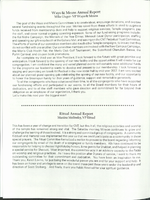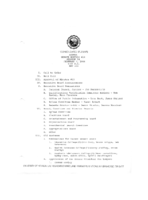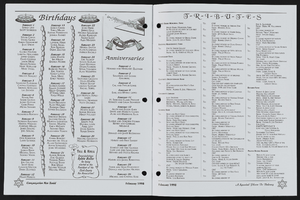Search the Special Collections and Archives Portal
Search Results

Annual report from Congregation Ner Tamid, 2006
Date
Archival Collection
Description
Annual report from Congregation Ner Tamid, 2006
Text

Meeting minutes for Consolidated Student Senate, University of Nevada, Las Vegas, February 7, 1984
Date
Archival Collection
Description
Text
Regional subject files, 1859, 1908, 1970-2015
Level of Description
Scope and Contents
The regional subject files include materials collected by anthropologist Katherine Spilde about Native American gaming, Native American communities in the United States, and the US and international gaming industries. The materials date from 1859 to 2015, with the bulk of materials dating from 1990 to 2010. Materials dating from the nineteenth and early twentieth centuries are a reproduction of a federal treaty and an ethnohistorical essay. The majority of the materials document Native American gaming following the passage of the 1988 Indian Gaming Regulatory Act. The papers include research and subject files created by Dr. Spilde during her employment with the National Gambling Impact Study Commission (NGISC), National Indian Gaming Association (NIGA), and Harvard Project on American Indian Economic Development (HPAIED). The materials document Native American gaming enterprises both on and off reservations, the socioeconomic impact of gaming, the political history of gaming in the US, and international gaming. The series includes socioeconomic reports, testimonies, correspondence, memos, press releases, photographs, audiovisual materials, promotional materials, brochures, fact sheets, summaries, booklets, pamphlets, advertisements, tourism materials, journal articles, legal briefs, legislative documents, court opinions, notes, presentations, conference materials, periodicals, community newspapers, and newspaper articles.
The collection contains documentation on a number of Native American nations, including the Misi-zaaga'iganiing Anishinaabeg (Minnesota Chippewa Tribe, Mille Lacs Band); Gaa-waabaabiganikaag Anishinaabeg (Minnesota Chippewa Tribe, White Earth Band); Forest County Bodéwadmi (Forest County Potawatomi Community); Ho-Chunk Nation of Wisconsin; Mashantucket Pequot Indian Tribe; Mohegan Tribe of Indians; Tulalip Tribes of Washington; Sisseton-Wahpeton Oyate of the Lake Traverse Reservation; Standing Rock Sioux Tribe of North and South Dakota; Mandan, Hidatsa, and Sahnish (Arikara) (Three Affiliated Tribes of the Fort Berthold Reservation, North Dakota); and Mississippi Band of Choctaw Indians. Other communities are also represented in the series, but to a lesser extent. In addition to materials about gaming and casinos, Dr. Spilde also collected documents, photographs, and audiovisual materials about Native American culture in general. The series documents regional and national trends in Native American gaming, and the greater gaming industry. Materials trace federal and state relationships with individual Native American nations, specifically concerning gaming enterprises.
Archival Collection
Collection Name: Katherine A. Spilde Papers on Native American Gaming
Box/Folder: N/A
Archival Component
Kane Springs Ranch Records
Identifier
Abstract
The Kane Springs Ranch Records (1930-2005) contain materials related to the Kane Springs Ranch in Meadow Valley Wash outside of Moapa, Nevada. The collection primarily focuses on the property itself, but also contains a genealogy of the Huntsman family, the ranch's first owners. Records include deeds and materials from the sale of the Kane Springs Ranch to the Bureau of Land Management in 2005. The bulk of the collection documents how the Bradley Stuart family used its resources from 1952 to 2003. These materials are related to water usage on the property and a rock and sand mining operation.
Archival Collection
Roger D. Foley Papers on United States v. Cappaert
Identifier
Abstract
The Roger D. Foley Papers on United States v. Cappaert are comprised of materials collected by District Judge Roger D. Foley while performing his duties as judge in
Archival Collection
Celesta Lowe oral history interview
Identifier
Abstract
Oral history interview with Celesta Lowe conducted by Patrick W. Canlton on February 06, 2002 for the Boyer Early Las Vegas Oral History Project. Lowe begins by discussing her early life in Baker, California and her father’s role as a station agent for the Tonopah Tidewater Railroad during the 1920s and 1930s. Lowe then describes her family moving to Las Vegas, Nevada in the 1940s. Lowe chronicles the process state legislatures took to open Nevada Southern University in 1957 and her role as an administrative assistant in the main office of the school. Lowe recounts her career at Nevada Southern University, the expansion of the campus, and renaming it University of Nevada, Las Vegas. Lastly, Lowe talks about her switch from an administrative assistant to a librarian at UNLV.
Archival Collection
Larry Ruvo oral history interview
Identifier
Abstract
Oral history interview with Larry Ruvo conducted by David G. Schwartz on January 27, 2009 for the Remembering Jay Sarno Oral History Project. Ruvo begins by discussing his position as a front desk clerk at Caesar’s Palace in Las Vegas, Nevada in the 1970s. Ruvo then describes how Jay Sarno changed the casino industry by designing Caesar’s Palace with a single theme. Ruvo then chronicles how gaming gradually was legalized in more areas throughout the world and how Sarno capitalized on making Caesar’s Palace an iconic casino which made people want to travel to Las Vegas. Lastly, Ruvo discusses Sarno’s focus on offering both gaming and entertainment options for guests at Caesar's Palace.
Archival Collection

Mariteresa Rivera-Rogers oral history interview: transcript
Date
Archival Collection
Description
Oral history interview with Mariteresa Rivera-Rogers conducted by Maribel Estrada Calderón on October 24, 2018 for the Latinx Voices of Southern Nevada Oral History Project. In this interview, Mariteresa discusses her early life in Concepción, Chile. She talks about her experience moving to Las Vegas, Nevada in 1965, the immigration process at the time, and becoming a Spanish language court interpreter. Rivera-Rogers recalls enrolling at the University of Nevada, Las Vegas' (UNLV) Sam Boyd School of Law, and her involvement with the Latino Bar Association. Lastly, Rivera-Rodgers discusses the challenges in translating Spanish language to English.
Text

Transcript of interview with Helen Naugle by Irene Rostine, October 31, 1996
Date
Archival Collection
Description
Prior to 1962, Helen Naugle had only visited Las Vegas once in her life while traveling from Idaho to California for a vacation with her husband and her boss. The group made a quick stop so her boss could interview for a position with EG&G and, as fate would have it, EG&G did not hire Helen’s boss. However, they did extend a job offer to Helen’s husband. A month later, Helen, her two daughters, and her husband became residents of Las Vegas, Nevada. Before moving to Nevada, Helen enjoyed singing in super clubs and performing on her radio show, “Melodies from Meadowland” and working for American Machine and Foundry. Upon her arrival in Las Vegas, Helen went to work for Bonanza Airlines before attending real estate school. In 1963, Helen opened her first office, Bruce Realty, and in 1965, she obtained her Broker’s license. She spent the next ten years selling general real estate. During this period, Helen was an active member of the Board of Realtors, as well as an early participant in the Board’s newly formed Women’s Council. Fate would strike again in Helen’s life while she was visiting her daughter at college in Arizona where she read an article in the Phoenix newspaper about a group of brokers who had formed a networking association to sell hotels and motels across the country. As a result of her initial contact with this association, Helen spent the next four decades selling hotels and motels throughout the State of Nevada, including Las Vegas, Elko, Tonopah, and Wells. She eventually became the first woman President of the American National Hotel-Motel Association. The cultural diversity of hotel and motel buyers would provide Helen with opportunities to travel the world and work with buyers from many different countries and cultural backgrounds. It also led to Helen’s membership in the FIABCI (International Real Estate Federation) and her Certified International Property Specialist and Federation of International Property Consultants certifications. Helen was also selected by the Association to represent the Air Force as “Innkeeper Evaluator” for one year. This honor took her to five Air Force bases in the United States and to Clark Air Force Base in the Philippines. During Helen’s career in hotel and motel real estate sales, she witnessed the transition from “mom-and-pop” American buyers to the influx of international buyers predominately from East India and Asia. The opportunities for helping repeat buyers and sellers gradually went away, as foreign buyers entered the market and tended to resell their properties to friends and family members from their own countries. During the latter part of her career, Helen found time to give back to the Las Vegas community through her volunteer work helping to establish the Scleroderma Foundation of Nevada. She also served on the Board of Directors of the Downtown Las Vegas Partnership where she focused on public safety in the area encompassing the Fremont Street Experience. Her work with both of these organizations allowed her to draw on her career experience for the benefit of others. Whether it was fate, or as Helen put it, she “just lucked into a lot of things,” one thing is certain - Helen Naugle was certainly a trail blazer for women in the hotel-motel niche of the real estate business, not only in Nevada, but across the nation.
Text

